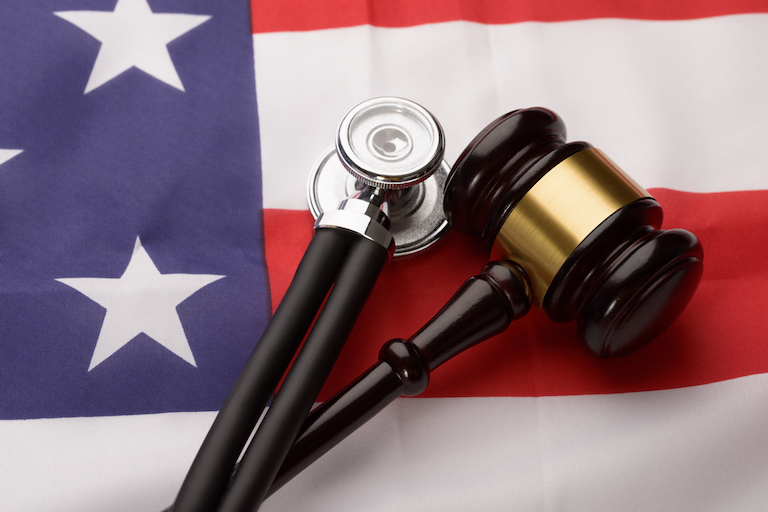COVID-19, the ACA, and the Role of the Federal Government

Our nation, a country where roughly 28 million Americans are uninsured, is currently battling the spread of the novel coronavirus (COVID-19). We are depending on decisive action on the federal level to help states and localities hardest hit by the outbreaks, and to guard against the virus spreading to areas where currently no cases have been reported. And most of all, we are focused on protecting the health of the vulnerable, who are at heightened risk.
The rapid spread of this virus serves as a powerful reminder that our health is connected to the health of our neighbor, that the health of the individual is connected to the health of our communities, and that the challenge of health care — regardless of state and local innovation — calls for national solutions and a federal government that understands its true power and responsibility to put in place those solutions.
The national and interstate realities of health care present themselves not only to public health authorities, but to courts as well. Perhaps the last time our high court truly grappled with the national nature of health care delivery and payment was in National Federal of Independent Business v. Sebelius. People might remember that case as the Supreme Court’s 5-4 decision to uphold the constitutionality of the Patient Protection and Affordable Care Act (ACA)’s individual mandate. But what they might not remember is that Chief Justice John Roberts, who was the deciding vote in the case, saved the ACA by focusing on Congress’s power to impose a tax. At the same time, he concluded that the mandate could not be upheld under Congress’s power to regulate interstate commerce because, in his view, regulating individuals’ decisions about whether to purchase health insurance did not have a sufficient connection to interstate commerce. These doubts have encouraged a string of follow-up challenges to the ACA, which continue to this day.
Regardless of whether and how Chief Justice Roberts’ doubts have resonated with conservative jurists, the COVID-19 crisis shows how little resonance they have in the real world.
As the White House and Congress considers the effects of COVID-19 on such things as the travel and hospitality industries, and watches the roiling of the financial markets, can there really be a question that the health of our nation’s people has profound effects on interstate commerce? And in the face of concerns about whether the millions of uninsured Americans will seek testing and care if they doubt their ability to pay for such things, can there be serious question that the failure to secure insurance can have profound effects on interstate commerce?
Also, in a nation where people routinely cross state lines (sometimes daily to commute to work), meaningfully addressing this health crisis will require more than the best efforts of states and localities providing for their residents. In short, this national health crisis will require national action. And it will require us not only to better understand COVID-19, but also to better understand the role of the federal government.
Fortunately, the Constitution creates a federal government with the power to address national problems with national solutions. After all, the failure of the Articles of Confederation, which did not provide for a strong central government, served as the backdrop for the Framers’ gathering in Philadelphia to craft our Constitution. Delegates to the Constitutional Convention adopted Resolution VI, which envisioned a Congress with the power “to legislate in all Cases for the general Interests of the Union, and also in those to which the States are separately incompetent, or in which the Harmony of the United States may be interrupted by the Exercise of individual legislation.” This resolution served as an instruction to the Committee of Detail that was charged with drafting our Constitution’s Article I, which provides for congressional powers.
While the Framers might not have been able to envision any particular national crisis facing our nation in 2020, it is clear that they envisioned a Congress that might have to address a state problem that had effects that spilled over into other states, and a Congress that would have to step in when facing a situation in which states, acting alone, might never be able to address the problem. Health care fits both scenarios, even if we often fail to properly appreciate that until faced with an infectious disease crisis like COVID-19. Put another way, the doubts of Chief Justice Roberts find support neither in the reality of health care delivery nor in the text, history, and values of our Constitution.
At this moment, our nation is rightly focused on how to keep our nation’s people safe from COVID-19. That challenge will require ingenuity and leadership at the state and local level, but it will also require comprehensive and decisive action at the federal level. Understanding Congress’s proper role, and the constitutional support for the exercise of that role, is critical for the health of our nation’s residents. And it is critical for the health of our republic, as well.
Praveen Fernandes, JD, MPH, is Vice President for Public Engagement at Constitutional Accountability Center, a public interest law firm and think tank dedicated to promoting the progressive promise of the Constitution’s text, history, and value
